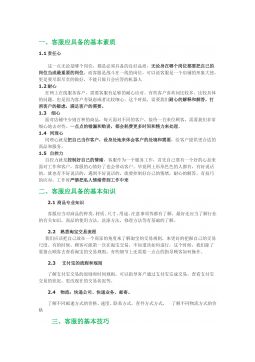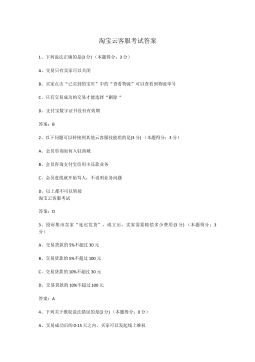2010年12月英语四级真题
2010年12月英语四级考试真题PartIWriting(30minutes)Directions:Forthispart,youareallowed30minutestowriteashortessayonthetopicofDueAttentionShouldBeGivenToSpelling.Youshouldwriteatleast120wordsfollowingtheoutlinegivenbelow: 1.目前不少父母为孩子包办一切 2.为了让孩子独立,父母应该……HowShouldParentsHelpChildrentoBeIndependent? PartIIRe...
相关推荐
-
网络营销技巧分享VIP免费

 2025-02-28 8
2025-02-28 8 -
最系统销售培训资料VIP免费

 2025-02-28 6
2025-02-28 6 -
最系统的房地产销售培训资料VIP免费

 2025-02-28 6
2025-02-28 6 -
资深业务人员的谈判技巧VIP免费

 2025-02-28 5
2025-02-28 5 -
珠宝终端店销售培训VIP免费

 2025-02-28 6
2025-02-28 6 -
中国移动客服亲和力电话营销培训VIP免费

 2025-02-28 5
2025-02-28 5 -
医药代表专业销售技巧培训VIP免费

 2025-02-28 4
2025-02-28 4 -
医药代表销售技巧高级培训VIP免费

 2025-02-28 7
2025-02-28 7 -
医药代表培训宝典(最新)VIP免费

 2025-02-28 7
2025-02-28 7 -
新入职大学生培训方案全套VIP免费

 2025-02-28 6
2025-02-28 6
作者详情
相关内容
-

淘宝直播红人经纪合同-9页
分类:人力资源/企业管理
时间:2025-06-11
标签:无
格式:DOC
价格:10 玖币
-

淘宝在线客服培训资料【精华整理版】-10页
分类:人力资源/企业管理
时间:2025-06-11
标签:无
格式:DOC
价格:10 玖币
-

淘宝运营绩效考核方案-8页
分类:人力资源/企业管理
时间:2025-06-11
标签:无
格式:DOCX
价格:10 玖币
-

淘宝运营方案-11页
分类:人力资源/企业管理
时间:2025-06-11
标签:无
格式:DOCX
价格:10 玖币
-

淘宝云客服考试答案-7页
分类:人力资源/企业管理
时间:2025-06-11
标签:无
格式:DOCX
价格:10 玖币




 渝公网安备50010702506394
渝公网安备50010702506394
